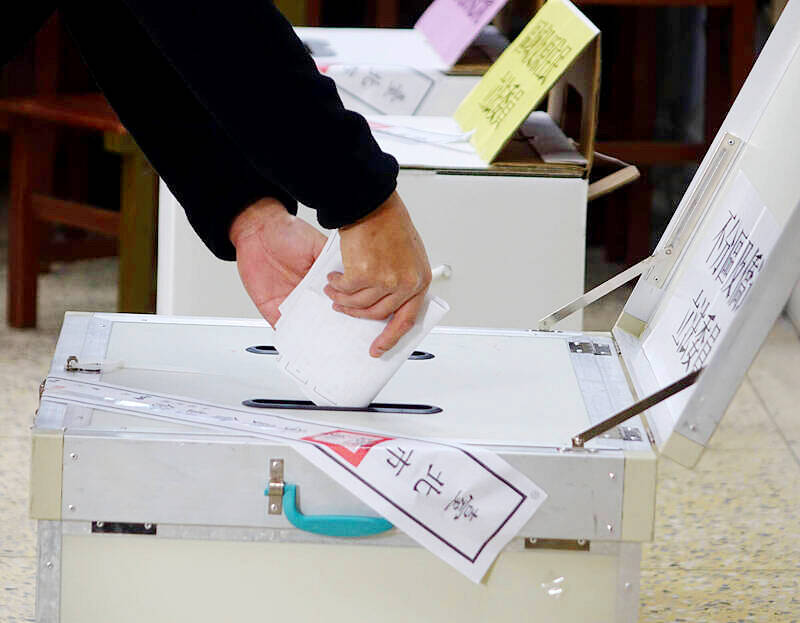The Constitutional Court yesterday ruled that any candidate running for public office can request a recount if the result of an election is within a certain margin, after a township representative candidate who lost by two votes was ineligible to request a recount last year.
The court determined that Article 69 of the Public Officials Election and Recall Act (公職人員舉罷免法) was unconstitutional and should be amended immediately.
The article applies to elections for central government public officials, municipal mayors, city mayors and county commissioners.

Photo: Taipei Times
Democratic Progressive Party (DPP) member Yeh Kao-chieh (葉高潔), who ran last year to represent Hsinchu County’s Sinfong Township (新豐), filed a lawsuit for a recount after losing the election by two votes, claiming that the article violated the principles of equality and proportion.
The Hsinchu County District Court denied the request, saying that recounts did not apply to township representative elections and that the intention of the law was to separate categories of elected officials.
Yeh filed for a constitutional interpretation after the High Court upheld the first appellate court’s ruling.
The Constitutional Court reviewed the case on Oct. 20 and ruled that the Central Election Commission’s Hsinchu branch should retain the candidate roster and ballots for six months until the review was concluded or when the Constitutional Court revoked such an order without the plaintiff requesting a provisional injunction.
The ruling yesterday marked the first time the Constitutional Court made a judgement on the merits of an election-related case.
The court decided that the article’s preclusion of certain candidates from applying for a recount — if the difference in votes received by the candidate elected with the lowest number of votes and the candidate not elected with the highest number of votes is within 0.3 percent — was unconstitutional.
The recount system seeks to uphold the fairness of elections and protect people’s electoral rights, and should not have different standards based on elected offices, the court said.
The ruling also stated that until amendments to the act are completed, candidates in public elections who have lost, but whose number of votes was within the 0.003 margin of error, may apply to their district court to seal all or a portion of the ballots and call for a recount, which should be completed within 20 days.
The court stated that the legal grounds of the High Court ruling had been rendered null and remanded the case back to the High Court for a retrial.
Additional reporting by CNA

The US government has signed defense cooperation agreements with Japan and the Philippines to boost the deterrence capabilities of countries in the first island chain, a report by the National Security Bureau (NSB) showed. The main countries on the first island chain include the two nations and Taiwan. The bureau is to present the report at a meeting of the legislature’s Foreign Affairs and National Defense Committee tomorrow. The US military has deployed Typhon missile systems to Japan’s Yamaguchi Prefecture and Zambales province in the Philippines during their joint military exercises. It has also installed NMESIS anti-ship systems in Japan’s Okinawa

‘WIN-WIN’: The Philippines, and central and eastern European countries are important potential drone cooperation partners, Minister of Foreign Affairs Lin Chia-lung said Minister of Foreign Affairs Lin Chia-lung (林佳龍) in an interview published yesterday confirmed that there are joint ventures between Taiwan and Poland in the drone industry. Lin made the remark in an exclusive interview with the Chinese-language Liberty Times (the Taipei Times’ sister paper). The government-backed Taiwan Excellence Drone International Business Opportunities Alliance and the Polish Chamber of Unmanned Systems on Wednesday last week signed a memorandum of understanding in Poland to develop a “non-China” supply chain for drones and work together on key technologies. Asked if Taiwan prioritized Poland among central and eastern European countries in drone collaboration, Lin

TRAGEDY STRIKES TAIPEI: The suspect died after falling off a building after he threw smoke grenades into Taipei Main Station and went on a killing spree in Zhongshan A 27-year-old suspect allegedly threw smoke grenades in Taipei Main Station and then proceeded to Zhongshan MRT Station in a random killing spree that resulted in the death of the suspect and two other civilians, and seven injured, including one in critical condition, as of press time last night. The suspect, identified as a man surnamed Chang Wen (張文), allegedly began the attack at Taipei Main Station, the Taipei Fire Department said, adding that it received a report at 5:24pm that smoke grenades had been thrown in the station. One man in his 50s was rushed to hospital after a cardiac arrest

ON ALERT: Taiwan’s partners would issue warnings if China attempted to use Interpol to target Taiwanese, and the global body has mechanisms to prevent it, an official said China has stationed two to four people specializing in Taiwan affairs at its embassies in several democratic countries to monitor and harass Taiwanese, actions that the host nations would not tolerate, National Security Bureau (NSB) Director-General Tsai Ming-yen (蔡明彥) said yesterday. Tsai made the comments at a meeting of the legislature’s Foreign Affairs and National Defense Committee, which asked him and Minister of National Defense Wellington Koo (顧立雄) to report on potential conflicts in the Taiwan Strait and military preparedness. Democratic Progressive Party (DPP) Legislator Michelle Lin (林楚茵) expressed concern that Beijing has posted personnel from China’s Taiwan Affairs Office to its